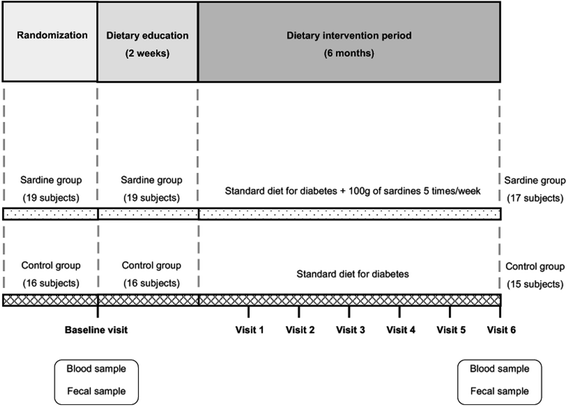Effects of sardine-enriched diet on metabolic control, inflammation and gut microbiota in drug-naïve patients with type 2 diabetes: a pilot randomized trial
- PMID: 27090218
- PMCID: PMC4836051
- DOI: 10.1186/s12944-016-0245-0
Effects of sardine-enriched diet on metabolic control, inflammation and gut microbiota in drug-naïve patients with type 2 diabetes: a pilot randomized trial
Abstract
Background: Nutrition therapy is the cornerstone of treating diabetes mellitus. The inclusion of fish (particularly oily fish) at least two times per week is recommended by current international dietary guidelines for type 2 diabetes. In contrast to a large number of human studies examining the effects of oily fish on different cardiovascular risk factors, little research on this topic is available in patients with type 2 diabetes. The aims of this pilot study were to investigate the effects of a sardine-enriched diet on metabolic control, adiponectin, inflammatory markers, erythrocyte membrane fatty acid (EMFA) composition, and gut microbiota in drug-naïve patients with type 2 diabetes.
Methods: 35 drug-naïve patients with type 2 diabetes were randomized to follow either a type 2 diabetes standard diet (control group: CG), or a standard diet enriched with 100 g of sardines 5 days a week (sardine group: SG) for 6 months. Anthropometric, dietary information, fasting glycated hemoglobin, glucose, insulin, adiponectin, inflammatory markers, EMFA and specific bacterial strains were determined before and after intervention.
Results: There were no significant differences in glycemic control between groups at the end of the study. Both groups decreased plasma insulin (SG: -35.3%, P = 0.01, CG: -22.6%, P = 0.02) and homeostasis model of assessment--insulin resistance (HOMA-IR) (SG: -39.2%, P = 0.007, CG: -21.8%, P = 0.04) at 6-months from baseline. However only SG increased adiponectin in plasma compared to baseline level (+40.7%, P = 0.04). The omega-3 index increased 2.6% in the SG compared to 0.6% in the CG (P = 0.001). Both dietary interventions decreased phylum Firmicutes (SG and CG: P = 0.04) and increased E. coli concentrations (SG: P = 0.01, CG: P = 0.03) at the end of the study from baseline, whereas SG decreased Firmicutes/Bacteroidetes ratio (P = 0.04) and increased Bacteroides-Prevotella (P = 0.004) compared to baseline.
Conclusions: Although enriching diet with 100 g of sardines 5 days a week during 6 months to a type 2 diabetes standard diet seems to have neutral effects on glycemic control in drug-naïve patients with type 2 diabetes, this nutritional intervention could have beneficial effects on cardiovascular risk. Furthermore, both dietary interventions decreased HOMA-IR and altered gut microbiota composition of drug-naïve patients with type 2 diabetes.
Trial registration: Trial number and name of the registry: NCT02294526, ClinicalTrials.gov.
Keywords: Nutrition therapy; Oily fish; Pilot trial; Sardine; Type 2 diabetes.
Figures
References
-
- International Diabetes Federation . IDF Diabetes Atlas. 6. Brussels: International Diabetes Federation; 2013. - PubMed
Publication types
MeSH terms
Substances
Associated data
LinkOut - more resources
Full Text Sources
Other Literature Sources
Medical
Miscellaneous



